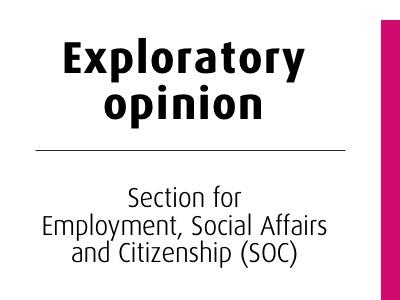European Economic
and Social Committee
Social Progress Protocol
Background:
The Social Progress Protocol (SPP) is an instrument that would give precedence to fundamental social and trade union rights over economic freedoms where these come into conflict, and in EU policies. The goal of the SPP is therefore to clarify the hierarchy of norms between fundamental social rights and economic interests, strengthen European social policies and encourage the implementation of the European Pillar of Social Rights (EPSR) in the Member States. It also aims to ensure full compliance with human and fundamental rights in EU law.
The SPP was first proposed by the European Trade Union Confederation (ETUC) in 2008 in response to European Court of Justice rulings in favour of economic freedoms in the Viking and Laval cases.
Last year, the SPP was mentioned in the Conference on the Future of Europe's (CoFoE) conclusions, which called for the EU Treaties to be changed so as to make the SPP a binding instrument in primary EU law. The European Parliament also adopted a resolution calling for the SPP to be incorporated into the EU Treaties. The European Commission is yet to publish its response to the CoFoE conclusions. The forthcoming Spanish presidency of the Council of the EU has asked the EESC for its take on the SPP in the form of an exploratory opinion.
European social partners do not agree on whether the SPP should be made a binding legal instrument. Trade unions are calling for it to be included in the Treaties and employers' organisations are arguing that the current legislation is sufficient to secure respect for fundamental social rights and that they should not take precedence over the EU's economic freedoms.
Key points:
In the opinion, the EESC:
• agrees with the proposal to add a social progress protocol (SPP) to the Treaties. The SPP aims to protect fundamental social rights where these rights conflict with economic freedoms and prevent any decline in those rights. It would ensure social progress by promoting and safeguarding the highest standards of social rights;
• encourages the Spanish presidency to convene a meeting of the Council of Social Affairs Ministers that would agree on a joint proposal and enable a specific EU summit to be held to adopt it. This issue calls for maximum institutional involvement across the various levels of EU competence;
• appreciates that, while the proposal from the CoFoE and the European Parliament would have to be introduced either in the form of a protocol (added to the TFEU) or in the form of a cross-cutting clause (reform of Article 9 TFEU), there are other policy instruments that could contribute to the aims of the SPP. The EESC considers the SPP to be essential in order to strengthen the autonomy of the social partners. It links the proper functioning of the single market and economic freedoms, including fair competition between the Member States, with respect and promotion of fundamental collective social rights. The EESC firmly believes that an SPP will enable the EU to be a leader when it comes to economic growth, the well-being of its citizens, and robust and sustainable businesses.
The text of the opinion can be found here.
Additional information
Section: Employment, Social Affairs and Citizenship (SOC)
Opinion number: SOC/756
Opinion type: Exploratory opinion at the request of the Spanish Presidency
Rapporteur: María del Carmen BARRERA CHAMORRO
Co-rapporteur: Diego DUTTO
Reference: Letter from the Spanish Presidency of the EU Council, 8/12/2022
Date of adoption by section: 31/05/2023
Result of the vote:70 in favour/28 against/ 9 abstentions
Date of adoption in plenary: 15/06/2023
Result of the vote: 132 in favour/102 against/7 abstentions (Members of the EESC Employers' Group tabled an amendment in the form of a counter opinion which was rejected but received more than a quarter of the votes cast. It is published in the Appendix of the opinion)
Contacts:
Press officer: Laura Lui
Tel.: 00 32 2 546 9189
email: laurairena.lui@eesc.europa.eu
Administrator: June Bedaton
Tel.: 00 32 2 546 9727
email: June.Bedatong@eesc.europa.eu
